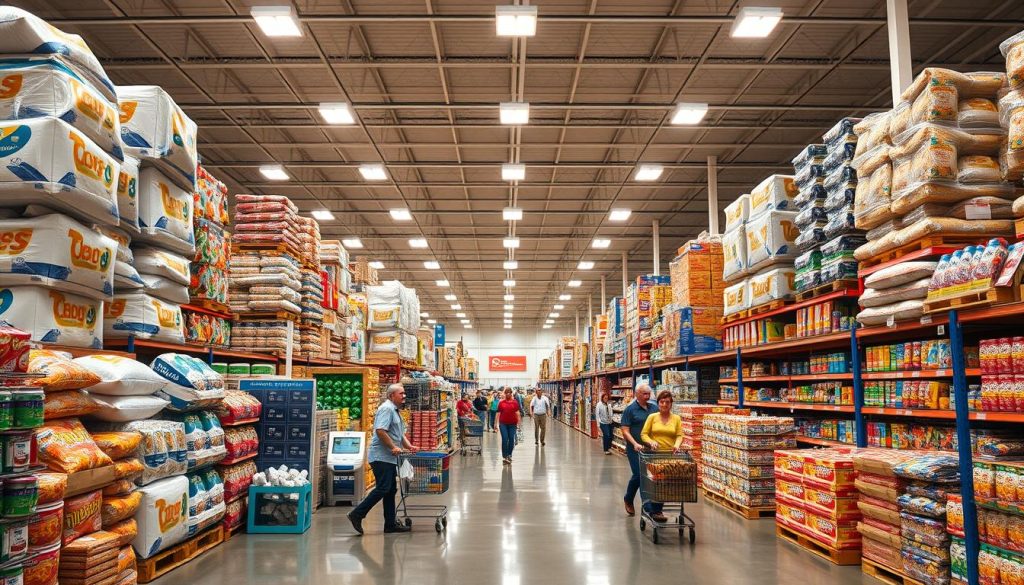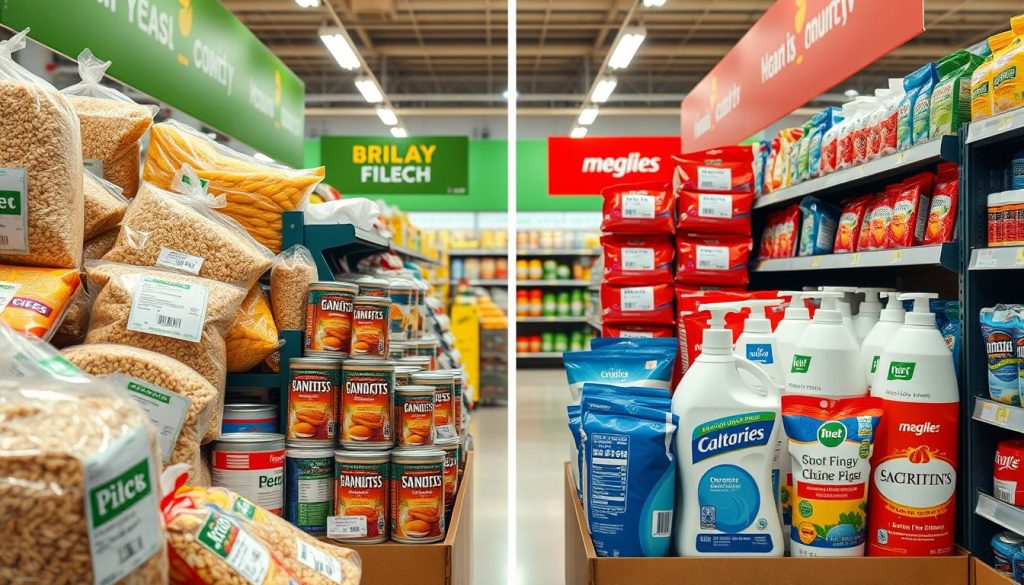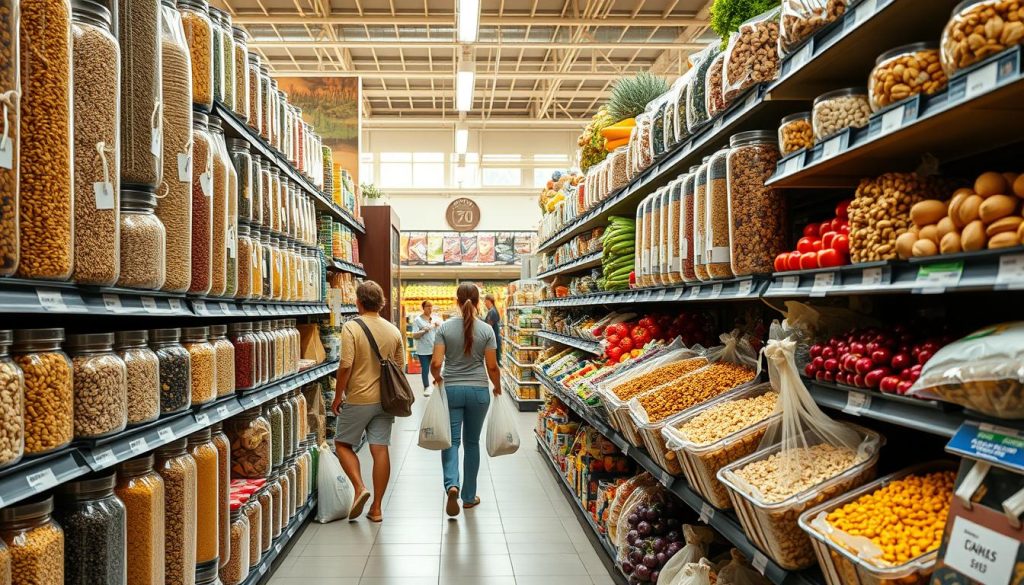I’m always looking for ways to save money. That’s why I’m excited about bulk buying. It’s a big win for my wallet and shopping habits. Buying in bulk can save a lot of money, making it a smart choice for many.
In this guide, I’ll share tips on making the most of bulk buying. We’ll cover finding great deals and managing storage. Whether you’re a busy parent, a small business owner, or just a bargain hunter, there’s something here for you. Let’s explore how bulk buying can change your shopping experience!
What is Buying in Bulk and Why It Matters
Buying in bulk is a smart way to save money and time. It means buying lots of products at lower prices. More and more people and businesses are using this strategy.
Understanding Bulk Purchasing
Bulk buying means getting more items than you usually do. You pay less per item when you buy more. It’s great for things you use a lot or won’t spoil soon.
Advantages of Large Quantity Orders
Buying in bulk has many benefits:
- Cost savings through volume pricing
- Reduced frequency of shopping trips
- Less packaging waste
- Stockpiling essentials for emergencies
Financial Impact
The financial benefits of bulk buying are big. It changes how you budget and manage money. Here’s a comparison of buying in bulk versus regular prices for common items:
| Item | Regular Price | Bulk Price | Savings |
|---|---|---|---|
| Toilet Paper (per roll) | $1.00 | $0.75 | 25% |
| Laundry Detergent (per load) | $0.25 | $0.18 | 28% |
| Rice (per pound) | $2.50 | $1.80 | 28% |
These savings add up over time. It’s a strong way to manage your budget. For businesses, it can also improve profits and cash flow.
The Psychology Behind Bulk Shopping
Bulk shopping taps into our deepest consumer behavior patterns. The promise of savings drives our decision-making. This leads us to buy more than we planned.
The fear of missing out is big too. Seeing a great deal on bulk items excites us. We don’t want to miss out on saving money, even if we don’t need it now.
Bulk purchases can change how we use products. Having lots at home means we use them more freely. This changes our shopping habits and budget planning over time.
| Psychological Factor | Impact on Buying Decision |
|---|---|
| Perceived Value | Encourages larger purchases |
| Fear of Missing Out | Drives impulse buying |
| Abundance Mindset | Increases consumption rate |
Understanding these psychological triggers helps us shop smarter. By knowing our tendencies, we can balance the appeal of deals with our needs and storage.
Where to Find the Best Bulk Deals

I’ve found some top spots for bulk deals. You can find great savings at wholesale clubs and online marketplaces. These places are perfect for those who want to buy in bulk and save money.
Wholesale Clubs and Membership Stores
Wholesale clubs like Costco and Sam’s Club offer big savings. They have a wide range of products. This makes it easy to buy essentials in bulk at lower prices.
Online Marketplaces for Bulk Purchases
Online giants like Amazon Business and Alibaba have changed bulk buying. You can compare prices, read reviews, and get items delivered. They often have great deals on bulk purchases, making it easy to shop from home.
Local Suppliers and Distributors
Local options are worth checking out too. I’ve found deals by connecting with local suppliers and distributors. They offer bulk purchases for both businesses and individuals. Look for local restaurant supply stores or farmers’ markets for unique deals.
| Bulk Buying Option | Pros | Cons |
|---|---|---|
| Wholesale Clubs | Wide selection, in-store shopping | Membership fees, limited locations |
| Online Marketplaces | Convenience, price comparison | Shipping costs, can’t inspect items |
| Local Suppliers | Support local businesses, unique items | Limited selection, variable pricing |
Calculating Cost Savings: Is Bulk Really Cheaper?

I often wonder if buying in bulk truly saves money. To find out, I dive into price comparison and unit pricing. These tools help me uncover the real value of bulk purchases.
Unit pricing is key. It shows the cost per ounce, pound, or item. I look at this number on both bulk and regular sizes. Sometimes, the difference surprises me. A larger package doesn’t always mean a better deal.
To calculate potential long-term savings, I consider:
- Storage costs
- Shelf life
- My usage rate
I create a simple table to track my findings:
| Product | Regular Price | Bulk Price | Unit Price Difference | Projected Annual Savings |
|---|---|---|---|---|
| Laundry Detergent | $12.99 | $29.99 | $0.05 less per load | $52.00 |
| Toilet Paper | $8.99 | $19.99 | $0.10 less per roll | $78.00 |
| Canned Vegetables | $1.29 | $10.99 (12-pack) | $0.13 less per can | $31.20 |
This analysis helps me make smarter shopping decisions. I focus on items with significant savings and avoid bulk buys that might go to waste. By doing this homework, I ensure my bulk purchases truly benefit my budget in the long run.
Smart Strategies for Buying in Bulk

Buying in bulk can save you money, but it needs careful planning. I’ve found that smart bulk shopping starts with a good strategy. Let’s look at some key tactics to make the most of your bulk purchases.
Planning Your Bulk Purchases
Before going to the store, I make detailed shopping lists. This keeps me focused and stops impulse buys. I think about my family’s needs, storage space, and budget when planning. Good inventory management is key for successful bulk buying.
Avoiding Common Pitfalls
I used to buy too much perishable food. Now, I stick to non-perishable items or things we use a lot. I also check unit prices to make sure I’m getting a good deal. Making sure I have enough space before buying is important.
Maximizing Savings Without Waste
To get the most value, I choose items that last a long time. I use older products first. For perishables, I freeze what we can’t use right away. This way, I save money and reduce waste.
- Create comprehensive shopping lists
- Compare unit prices across different sizes
- Plan storage space before buying
- Focus on non-perishables and frequently used items
- Portion and freeze perishables to extend shelf life
By using these strategies, I’ve changed how I buy in bulk. It’s not just about buying more; it’s about buying smarter. With careful planning and inventory management, bulk purchases can save a lot of money and reduce waste.
Storage Solutions for Bulk Purchases
Smart storage is crucial when buying in bulk. Proper pantry management can greatly improve your shopping experience. Let’s explore some tips to optimize your storage space and keep your food fresh longer.
Start by getting clear, airtight containers. They are essential for keeping food fresh and visible. I use them for flour, pasta, and snacks.
Label each container with the date you bought it and when it expires. This simple step helps me keep track of what’s good to eat. It’s a small effort that saves a lot of food from going to waste.
Organize your pantry into zones. Group similar items together. I have areas for baking, canned goods, and snacks. This makes it easy to find what I need and prevents me from buying too much.
Look into vertical storage options. Wall-mounted shelves or over-the-door organizers can add space to small areas. I use a lazy Susan for spices and condiments, making them easy to reach.
For non-food items, think outside the box. Use garage shelving for paper products or cleaning supplies. Under-bed storage boxes are great for extra linens or seasonal items.
Effective storage is about using space wisely while keeping things accessible. With these tips, you’ll make the most of your bulk purchases and have a well-organized pantry.
Buying in Bulk: Which Products Make Sense?
Buying in bulk can save you money and cut down on waste. I’ll show you which items are great for bulk purchases and which to avoid.
Non-perishable Items Ideal for Bulk Buying
Non-perishables are ideal for bulk storage. They last long and don’t spoil fast:
- Rice and pasta
- Canned goods
- Dried beans and lentils
- Paper products
- Cleaning supplies
Perishables: When to Buy in Bulk
Some perishables are good for bulk buying if planned right. Think about these points:
- Freezer space available
- How often you use them
- Can you preserve or process them?
Meats, cheese, and fruits are good for bulk if you can freeze or preserve them before they expire.
Products to Avoid Purchasing in Large Quantities
Not everything is good for bulk buying. Stay away from these items:
| Product | Reason to Avoid |
|---|---|
| Fresh produce | Short shelf life |
| Dairy products | Quick spoilage |
| Spices | Lose flavor over time |
| Oils | Can go rancid |
The secret to successful bulk buying is finding a balance. Make sure you can use what you buy before it expires. Always check the expiration dates and think about your storage before buying in bulk.
Bulk Buying for Businesses: Inventory Management Tips
Bulk ordering can really change the game for businesses. It helps save money and makes things more efficient. Let’s look at some tips for managing inventory with bulk purchases.
It’s key to balance bulk orders with just-in-time inventory. Bulk buying lowers costs, but you don’t want too much stock. Use data to predict demand and find the best order sizes.
Here’s a breakdown of bulk ordering considerations for different business types:
| Business Type | Bulk Ordering Approach | Key Considerations |
|---|---|---|
| Retail | Seasonal bulk purchases | Storage capacity, shelf life |
| Manufacturing | Raw materials in bulk | Production schedules, material volatility |
| Food Service | Non-perishables in bulk | Expiration dates, storage conditions |
| E-commerce | Popular items in bulk | Warehouse space, shipping costs |
To get the most from bulk buying, set up a good inventory tracking system. It keeps stock levels right, avoiding shortages and too much stock. This balance is crucial for saving money and keeping operations smooth.
Eco-Friendly Aspects of Buying in Bulk
Buying in bulk is not just smart for my budget. It’s also good for the planet! By choosing bulk, I help reduce our environmental impact.
Reducing packaging waste
Buying in bulk means fewer packages for me. This leads to less plastic, cardboard, and other waste in landfills. Many stores now offer eco-friendly options like reusable containers or paper bags. These choices help reduce waste even more.
Minimizing transportation emissions
Buying in bulk means I don’t have to go to the store as often. This cuts down on my carbon footprint. With fewer trips, there’s less pollution from transportation. It’s a small change that makes a big difference for our planet.
Supporting sustainable consumption
In my area, zero-waste bulk shopping is becoming more popular. Stores encourage customers to use their own containers. By shopping this way, I support businesses that promote sustainability. It’s a step towards changing our shopping habits for the better.

